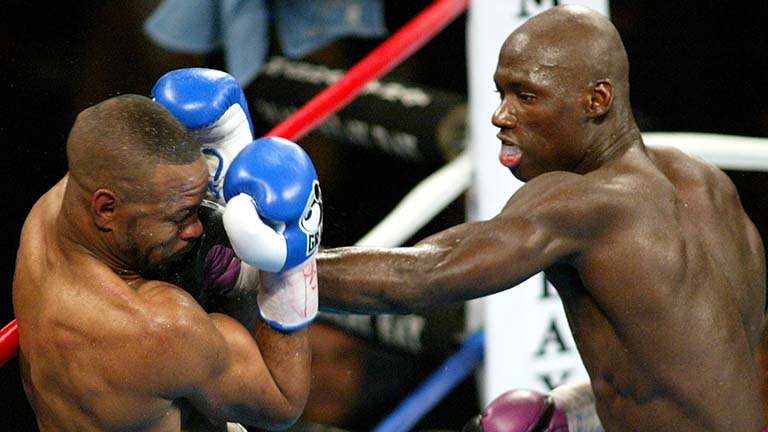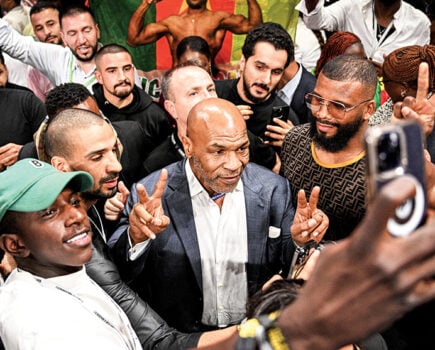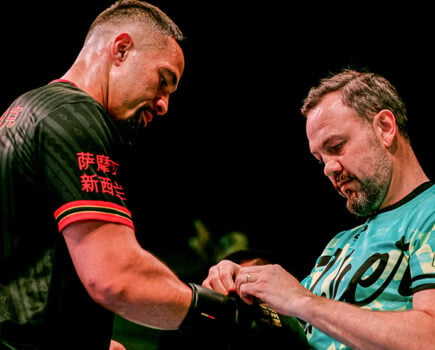I’LL say what I’m about to say with the sincerity and sensitivity of a parent revealing to their child Santa doesn’t exist: all your favourite fighters are drug cheats.
Okay, not all of them. But certainly some of them. That guy with the world title. That guy who moved through the weights. That guy who scored that highlight-reel knockout you watch again and again. That big guy. That small guy. That guy you loved when he was active and now refer to him as a ‘legend’ and a ‘hero’ and await his induction into the International Boxing Hall of Fame. Yeah, all those guys used performance-enhancing drugs (PEDs) at some point in their career.
To the hardened spectator, this is perhaps no great revelation, nor a big deal. After all, time and time again we forgive those who have failed a drug test and served their sentence because they are still fighters and we still want fights. If they produce good ones, that’s seemingly all that matters, irrespective of past transgressions. But spare a thought for the boxers who have had to actually get in a ring and oppose drug cheats, many of them having entered the sport under the false impression they’d be competing on a level playing field and that the boxer who woke the earliest and ran the furthest and punched the hardest and abstained the longest and downed the most raw eggs would ultimately be victorious. Consider those guys for a moment. For them, the bombshell is all the more jarring; pain and defeat is one thing, occupational hazards no less, but having their illusion shattered, albeit a naïve, fanciful one, means something else entirely.
“The sport I love is being prostituted and tainted,” says Philadelphia’s former two-time IBF cruiserweight titlist Steve “USS” Cunningham. “Everybody knows I’m clean, and me being clean and fighting a guy who isn’t makes me sick.”
This happened in August 2015 when Cunningham faced ex-undisputed world light-heavyweight champion Antonio Tarver. They fought to a draw in New Jersey only for Tarver, a man who popped for the anabolic steroid drostanolone in 2012 (following a draw with Lateef Kayode), to test positive for synthetic testosterone, for which he was banned six months and fined $50,000. It came as no surprise to Cunningham, of course. With the Kayode incident on his mind, he even told Tarver at the pre-fight media workout that he would file a lawsuit against anyone – he purposely kept it vague – who failed a drug test after sharing a ring with him.
“You don’t want to think he’ll cheat because he has already been caught once and there’s a spotlight on him,” says Cunningham. “But that just goes to show you the mindset of Antonio Tarver. He doesn’t care. He knows he has his star power and he knows it will make him money regardless.
“I now believe all his big fights should be in question, especially that 2004 knockout of Roy Jones. But the boxing community don’t really understand the depth and severity of it. When Tarver popped, I went on his Facebook page and his fans were patting him on the back and saying, ‘Oh, we know they’re lying.’ I’m thinking, ‘Hang on a minute, the dude failed a second test! What more proof do you fools need? He’s a cheat.’ It showed me that a guy with his type of star power, a future Hall of Famer, can do basically anything.”
He knocked out Roy Jones. He played Mason “The Line” Dixon in Rocky Balboa. Alas, fight fans find reasons to forgive and forget, much to Cunningham’s chagrin, and the deceit continues. Tarver is still active. He still commentates for television. He remains a personality very much in demand.
“In a perfect world, if you fail one drug test, you need to be stripped of everything and banned for life,” says Cunningham. “I’m a grown man. I’m not going to put anything in my body without knowing exactly what it is. If they give you a pill or powder or shake or needle, why would you take it? All excuses are bulls**t. These guys get desperate and try to find a way out.”
If given the option, heavyweight David Price would have gobbled up the chance to salvage a draw in dirty bouts with Tony Thompson (July 2013) and Erkan Teper (July 2015). Fate, however, conspired to deal the Liverpudlian a much heftier blow. He was stopped twice, outlasted in one fight, knocked out in the other, and only some time later did he discover both his opponents had failed drug tests (Thompson for hydrochlorothiazide, Teper for an entire lab’s worth of unpronounceable PEDs). The results of the fights left Price’s career in turmoil, while the results of the tests spun him into a state of paranoia.
“I would never dream of doing anything like that for two reasons,” he says. “One, it’s completely wrong on an ethical level. Two, I’d be f*****g terrified of getting caught. It’s my livelihood. If I get caught and banned, it’s over. In my naïve mind, nobody else was risking it for the same reasons. But the truth is, they f*****g are. There’s a lot of unscrupulous people out there who will do anything to get the upper hand. Teper, for example, had been caught before [in June 2014]. If I’d known that, I would have probably refused to fight him. Knowledge is important. You need to know about an opponent’s past. Going forward, it has definitely made me paranoid.”
In the lead-up to their October 2012 fight in Brooklyn, New York, Danny Garcia knew Erik Morales, the great Erik Morales, failed two drug tests for clenbuterol, the PED that saw Alberto Contador stripped of the 2010 Tour de France title, but was also aware that “El Terrible” had supposedly passed a third test during fight week, which is to say he hadn’t officially violated the three-strikes-and-you’re-out drug testing policy of the New York State Athletic Commission. Furthermore, he knew Morales was 38 years of age and long past his best, and he knew he stood to pocket around a million dollars for beating up the leathery Mexican. So that’s why the fight, one shrouded in controversy, went ahead.
Amir Khan, on the other hand, took the opposite approach upon being informed Lamont Peterson had tested positive for a banned substance (the American admitted to testosterone replacement therapy) ahead of their proposed rematch in May 2012. He, unlike Garcia, felt going through with the fight, bumper payday and all, wasn’t worth the risk it now entailed.
“Chris Byrd [the former IBF heavyweight champion] told me he fought guys on the juice – a lot of them – and reassured me by saying you can still beat them,” says Cunningham. “So that was my mindset going into fights where I knew someone was on drugs. You weigh it up.
“In my position, I’m going abroad a lot. I’m up against it. You go to some guy’s hometown and you’re fighting the star of that country. It’s bigger than just a fight. Things get overlooked when there’s that much riding on a guy getting a win.”
In a damning indictment of the state of the game, Cunningham, when pressed to put a figure on the opponents he believes were enhanced by drugs when sharing a ring with him, quickly loses count. “Too many,” says the 16-year professional, chuckling at the absurdity of it all.
“Okay, what about just championship fights?” I say.
He pauses. Mumbles a little. “One, two, three, four, five, maybe six… Yeah, I’d say, in my nine championship fights, five or six of those guys were definitely using performance-enhancing drugs. For sure.”
“How can you be certain?”
He laughs a second time. “Man, fighters talk, coaches talk. When we go to training camp, it’s boring, there’s downtime. Boxing is a very small community and a lot of people know who is using.
“Also, my trips to Europe showed me a lot, and just fighting at a level where titles are at stake has shown me a lot. When there’s big money involved, people do crazy things to get and retain power.”
Cunningham, now 40, has emerged relatively unscathed. He has confronted drug cheats in the ring, taken that risk, and points defeats have been the extent of his suffering. Price, on the other hand, has seen a promising career in the heavyweight division, the division in which big bucks can be made and lives can be changed, cruelly derailed as a result of crucial crossroads fights not going his way. He has been knocked out. He has missed out on paydays. His reputation has unfairly been dented. Chinny. Fragile. Overhyped. He has heard it all. Retirement, they said, was his only option. He split from his trainer. He deconstructed his own character. All because of what he calls “cheating rats”.
“I’m my own worst critic,” he says. “So, initially, I thought it doesn’t matter if they cheated, I still lost those fights. But then I spoke to people about it and they put me right. The Teper fight, in particular, may as well have been a sparring session in the gym that went wrong and ended up on YouTube. It shouldn’t be classed as a proper fight.
“I’ll never know because I’d never do it, but I’d love to know what it feels like to be on whatever Teper and Thompson were on. If they’ve been breaking records in training, feeling unbeatable, lifting more, running quicker, throwing more punches, recovering quicker, the energy of the fight swings in their favour before the first bell has even rung. They’ve got an edge psychologically. They believe they are invincible. I have to tell myself it made a difference.”
Price, like every other boxer, yearns for this psychological edge each time he sets foot in the ring. He looks for reasons to be confident. He walks tall. He sieves out negativity. He tells himself he is the biggest puncher in the division and that he has the edge over his opponent in all other departments. But now he can never truly be sure.
“I’ve always been accused, and rightly so, of not believing in myself,” he continues. “I get in the ring and hope I’m going to win. I have little doubts. And that night against Teper was no different. The thing is, though, when I knocked out Audley Harrison in one round, I had the same doubts but I got the job done. So I know Erkan Teper had a massive advantage psychologically, emotionally and physically against me. And Tony Thompson may have had the same.”
This is all new to Price, this sudden suspicion and cynicism, but a veteran like Cunningham has been shooting sideways glances for years. “The names I’ve heard using, even from back in the day, just depress me,” he says. “The guys you think are legendary, many of them weren’t clean. And it’s the same today, of course. People don’t understand how rampant this crap is. They don’t understand how many big-name fighters are on something.”
Unshackled and angry, Cunningham finds comfort in disclosing a few of these names. One of them has a title shot coming up. He’ll get away with it, Steve says. They always do. “The tests cost a lot of money and they don’t test for everything,” he adds. “That’s the problem. There are too many illegal enhancements slipping through the net. Guys know what the testers are looking for, so they use some other stuff and time it right.”
Deny the guilty ones further opportunities, Price believes. Ignore them, make them outcasts. For this reason he’ll never again fight Erkan Teper despite a thirst for revenge. It’s also the reason why he recently turned down a bout with Antonio Tarver. “By taking a fight with Tarver, I’d almost be condoning his actions,” he explains.
Cunningham appreciates the support. It’s not exactly forthcoming elsewhere. “I went to file a lawsuit against Tarver and visited a lawyer who basically told me that in order for me to win, even though Tarver failed a test,
I had to incur some other damage aside from what normally happens in a boxing match,” he says.
“That means something other than a cut eye, a bruise, concussion and so on. I had to have either been put in a coma or killed. Only then would they do anything about it. That’s when it really hit me. You can’t sue drug cheats unless you’re disabled or dead.”
In April 1994, Londoner Bradley Stone tragically died at the hands of British super-bantamweight champion Richie Wenton, a mild-mannered Liverpudlian whose aim was to win, not kill.
Stone was stopped in 10 rounds inside Bethnal Green’s York Hall and then collapsed at his fiancee’s flat. He passed away two days later. Wenton, meanwhile, got wind of Stone’s deterioration back in Devon, when in the process of parading his new belt around town, and was hit hard. He was clean, he had won fair and square, he was the underdog-turned-champion, yet all this seemed beside the point when faces in the community suddenly toughened in his presence. No longer joyful and pleased for him, they were instead now inquisitive and judgemental. They questioned his initial exuberance, questioned the ease with which he soaked up the acclaim, questioned the very nature of his sport. Some even held him accountable. His life, let alone career, was never the same.
Six years on, in May 2000, Wenton faced Gary Thornhill in his penultimate fight. He was stopped in eight rounds.
“The dirty little b*****d was on speed,” Richie says years after the fact. [Thornhill did indeed test positive for amphetamines and was stripped of the British featherweight title and banned for six months.]
“I boxed him three times as an amateur and stopped him every time,” Wenton goes on. “So, when [promoter] Frank Warren put a few names to me, I picked Thornhill as an opponent because I thought I’d beat him. Well, he comes to the weigh-in all amped-up and angry and I thought he must be struggling at the weight. He was shouting his mouth off.
“He then gets in the ring, we go eight rounds and I say to my corner, ‘That’s it, pull me out. I’m not going on with him.’ He was like a machine, pushing forward all the time. I was talking to him in the ring and saying, ‘You’re going to get tired. You’ll slow down.’ He wouldn’t talk back to me, though. He just kept coming.”
Wenton stops, shakes his head in disbelief, then continues, “Imagine if he had badly hurt someone in that state. Or killed someone. That’s as good as murder. At least manslaughter. Believe me, I know more than most how dangerous this f*****g game is. It’s me who was once called a ‘killer’, remember. But these drug cheats – whether caught or not – are the ones truly getting away with murder.”






